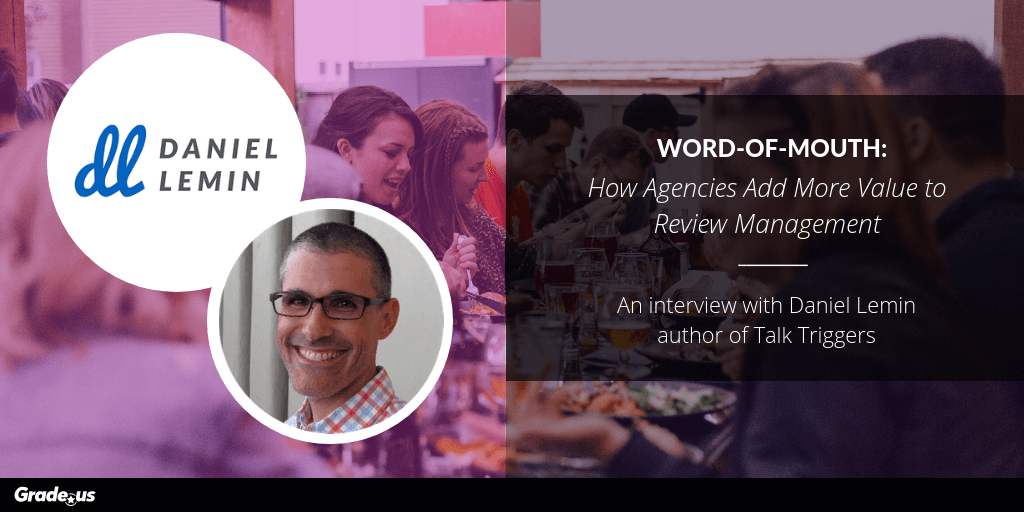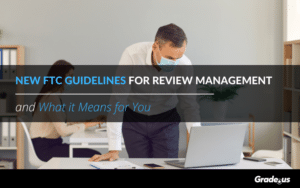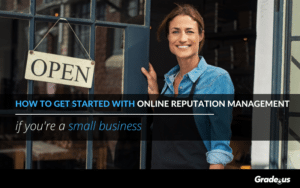When you get Daniel Lemin on the phone, he comes across as a modest guy. Don't let that distract you from the fact that this guy knows his stuff.
But he's down-to-earth, laid back, friendly. You'd never guess he might have just popped in to talk to you after wrapping up an interview with Fox News, or The New York Times. I think if I'd just happened to run into him into a coffee shop, I never would have guessed his credentials are so darn comprehensive.
Which are impressive. He's a former member of Google's global communications team who led product launches around the world. He's been the entrepreneurial force behind several start-ups.
He's the author of two books: Manipurated, and Talk Triggers, in collaboration with Jay Baer, who we've also interviewed on this blog.
Daniel's a leading expert on review management and word-of-mouth advertising. And lately he's been doing some hands-on teaching, working with businesses to help them spark their own word-of-mouth advertising, and with agencies who want to develop services to help their clients do the same.
If you're an agency owner or consultant, these are insights you do not want to miss.
Here's the lightly edited transcript of our conversation.
On the state of online review management
Carmen: You're one of the premiere experts on review management and marketing. Since you wrote your book Manipurated in 2015, what's changed in the review management world? Do you think reviews have become more important or less important since you wrote that?
Daniel: Oh, I think they've only become more important since then. It's just the changing dynamic of where people go for information, and how they make purchase decisions. They're constantly in search of feedback from people like themselves. It's just consumer nature.
I think reviews have become only more important and that's a trend that will continue.
Carmen: Do you think the rules have changed for acquiring, monitoring, and responding to reviews? Or for using them in your marketing strategy?
Daniel: Yeah, for sure. On a very practical level the rules have changed.
A lot of platforms have put restrictions around, or stronger guidance around, how companies can ask for reviews.
Yelp, for example, more or less outright tells you not to do it. And I think the general consensus, a lot of companies are coming to is it's better to let people be themselves. If we can encourage them to take part in our journey great, but we need to let people kind of be themselves.
Asking for reviews and asking for feedback are two different things.
We often see companies doing like, hey, please rate me five stars on Yelp or TripAdvisor, which is definitely a fading tactic. I think people are moving more towards just asking for feedback or letting customers know they're on Yelp, Trip Advisor, or Google. I think there's some changing dynamics there.
We also see companies putting increased importance on generating reviews for themselves.
We call them first party reviews, which is an important thing for all companies to consider.
Carmen: So they have them on their website and they own them. Those types of reviews?
Daniel: Exactly. Yep.
On review management and customer support
Carmen: What's the current relationship between customer service and online review management?
Daniel: Customer service and online review management are cousins. It is often that online reviews are where we see complaints surface.
There's interesting data about that. I think worth considering is some research I discovered when I was looking at stuff for my book.
Generally speaking if someone's gone off to a Yelp or TripAdvisor forum and left a valid, legitimate complaint, not just a jab, but an actual complaint, that it isn't probably the first time they've tried complaining.
In a restaurant, they might have mentioned it to a server. For a service, they might have mentioned it to the front office staff.
It's an interesting question because at that point it's now in the public. We're left to deal with that complaint in open view.
So the connection there to customer service is, there's an opportunity to do a better job training everybody in the organization to be better at it. It can help prevent some of the bad reviews from taking place in the first place, which is definitely an objective we can all agree is helpful.
On agency review management services and best practices when working with clients
Carmen: If you're an agency offering review management services to a small business, how would you recommend providing them with that strategy and where would you begin?
Daniel: It starts with an audit. We need to know the state of nature. Where you stand today, yourself, and in relationship to your competitors or your peers.
From there, we need to consider topically what are the most common areas of complaint. Maybe we need to address those as a strategic imperative.
We also need to look at it in terms of getting customers fired up to talk about our business.
In many cases, we're not giving customers an excuse, or any reason, to talk about us. We're just hoping the service is decent enough, the food is decent enough, that they will.
An alternative approach to that is rather than asking for reviews, which a tactic with fading returns, or maybe declining returns, maybe we need to focus on doing something a little bit different in the delivery of our products and services that people want to talk about.
It's a word-of-mouth strategy, but it has rating and review implications.
So for agencies, I think there can be a lot of energy and effort around helping customers, and clients, be more talk-worthy, review-worthy, in the first place.
Carmen: You and Jay Baer talked about that in Talk Triggers.
Daniel: That's right.
Carmen: So if you were an agency, and you went in to say, a restaurant and they were just doing that-- decent food, but not great food, and there's no reason to talk about them. How do you counsel them? How do you look at them and say, "Hey, here's what you can do to get people to talk about you?"
Daniel: I'll give you a case study, or maybe a bit of a story which might help give some context to that.
There are different things restaurants can do that are above and beyond the delivery of the food itself.
There's a restaurant in the Sacramento area called Skip's Kitchen, which is a quick-serve restaurant, a lot like a Chipotle or that kind of restaurant.
The thing they do kind of different is, it's the kind of place where you place your order for your patty melt or whatever, and then they give you a number to put on your table and bring your food to you.
The kind of spin they put on the experience is when they give you the number, it's not just a random number they assign you. They actually pull a deck of cards from under the counter, fan them out, and implore you to pick a card. So you reach into the deck and pick a card. If it happens to be a Joker, you get your meal for free.
Now, generally, in the course of a day, Skip gives away two meals. It's not a free tactic he's doing. But one thing for sure happens when someone draws a Joker.
They go bananas! They go crazy! I mean they instagram it, they're shouting about it, and if you go on TripAdvisor or Yelp you'll see many references to Skip's Kitchen and the Joker.
What's fun about that is it elevates that away from the quality of the food. It's a good restaurant, but it adds a customer experience element that's inherently a story people can tell.
That's the exact kind of thing that connects word-of-mouth strategy to ratings and reviews.
Giving people the right kind of material to work with when they go out and talk about us and review us.
Carmen: So that new client, do you just tell them a story like that, and start them brainstorming on what they can do with their business?
Daniel: Yeah, there's actually a whole process we can go through to help clients find the right kind of idea.
Six step process. One step is going out and doing customer interviews. Something an agency can do for their clients. Others, obviously the brainstorming phase. There's the testing and measurement phase which is great for agencies. Then the broader narrative around the word of mouth idea, a talk trigger, that can help elevate it.
Little things you can do to not necessarily advertise it. The little kind of advertising pieces that can come out of the talk trigger.
All of those are services agencies are in a very good position to deliver.
Carmen: If you're just a brand new agency, just getting started offering this sort of service to clients, would you recommend picking a specific industry, and learning that inside and out, or do you recommend targeting a broad range of industries?
Daniel: I'm a fan of niche industries. I think there is plenty of air in the room for everyone to breathe. Particularly if you go into a niche audience. Accounting, real estate, dental practices.
Each of these have varying needs and customer dynamics. You become the expert in that industry. That is one way to really make a name for yourself as an agency.
The alternative to that is you become a regional specialist. So not necessarily just in real estate. You're all things St. Louis, and you only work with St. Louis companies. You know how St. Louis customers and shoppers behave.
So there's different ways to become a specialist, but I'm a big fan of it, especially for a small, growing agency.
On the future of review management services and platforms
Carmen: What predictions do you have for the future of online reviews, and what can businesses do to prepare themselves for it?
Daniel: I think talk triggers is actually a good one to talk about there. The future is not in advertising. The future is not in having more social media presence. I think all of us are at our limit at how much of that we can do. Or want to do. Or can afford to do.
I think that the future really is in this more organic word-of-mouth energy. And that is, for me, when I think about two years from now in marketing and small business, that's what I think about.
In most cases, somebody in an industry is going to become the winner at word-of-mouth. They're going to become very good at it. The clock is ticking on that.
Carmen: So you getting good at helping clients craft an experience is going to trump pushing the message out there?
Daniel: I think so.
Certainly this isn't a thing that replaces all the other pieces of a marketing mix.
But we can only do those other things for so long. I'm not suggesting people stop advertising, or stop using social media. It's necessary to continue to do them. But this is an additional part of the mix.
Carmen: So we shouldn't be worried services like Grade.us would be going away!
Daniel: Actually, I think they're essential to the word-of-mouth experience. I think they're essential to the ultimate management of the whole process.
The thing with ratings and reviews is you have to be current and present and if you are not, no matter how good your talk trigger is, no matter how good your patty melts are, eventually people will turn on you.
So the software question is about having the right tools in the mix to get the work done quickly. I think for any business owner or agency, that's really it. They need the right tool to help them make the most of the opportunity.
Carmen: It's almost like you make an experience and then have a conversation. You trigger the review, then the other part of closing the loop is getting in there and interacting with your customer?
Daniel: Exactly, yep.
As a customer you appreciate that happening.
As a business, eventually you begin to appreciate how that improves your operations. And if you're an agency serving them it's value added.
Carmen: When you get that feedback, changing what you do or tweaking what you do to make your business better.
Daniel: Yep, exactly.
On the agency challenges and working with larger organizations
Carmen: Do you personally offer consulting services for agencies and other consultants? And if so, what do those look like?
Daniel: I do. I help a small number of agencies create a word-of-mouth product for their clients. So I teach agencies how to do this for themselves, how to create a financial model for it.
I've been working with a small number of direct clients, consumer brands, and B2B, throughout the year to create talk triggers and look at ratings and reviews too.
Carmen: What are some of the challenges the agencies bring to you?
Daniel: It's a different skill set to some degree. It isn't a "go out and build me a website" skillset.
I think sometimes it's difficult for agencies to envision what the block of hours they sell looks like, what that gets filled with. I think that's one.
The other question about it is who is their client for this?
Is it their current client, or does it open a conversation for potential new customer types within an organization?
Is it a different type of client within those organizations?
Some of the conversations with agencies revolve around those things.
How do we fairly value our time for this, and is this something I can sell to my current client?
I don't know, it's an interesting question.
Of course it depends on the client.
Carmen: When they ask you that, about valuing their time, what do you usually tell them?
Daniel: As with any strategic planning process, there is a value placed on the process, and there's a value placed on the outcome.
The outcome is to get customers talking about the business. If we create a bundle of services around Option A, which is the strategy process, then can we create residual income around Option B.
If you've got customers talking about you, how can we be compensated for that?
I've had some interesting discussions with agencies on pricing.
The truth is, word-of-mouth doesn't just happen. It's not a one-time process. It needs to evolve over time. In some cases it might be a one-shot deal. In the Skip's Kitchen example it might be a one-time deal.
In larger organizations it needs to evolve.
Talk triggers, word-of-mouth, it changes as the world around it changes.
Carmen: What does this evolution in the big organization look like? Do you have a case study there?
Daniel: Yeah, a great one is Doubletree Hotels. If you stayed in a Doubletree Hotel, you're probably familiar with the warm chocolate chip cookie welcome they give you when you arrive, which I always look forward to.
Quite honestly I don't always look forward to the hotel itself. Doubletree Hotels are of varying standards, but the cookie is consistent.
The thing about that cookie experience is they've done it for thirty years. Over the years it's changed.
It started out as a turndown service amenity. Then it became a cookie. Now they've added a gluten-free cookie and a nut-free cookie. They just launched the 30th anniversary of the cookie.
If you look at some of the Doubletree Branding, in general, a lot of it is all about the cookie. Their airport shuttle busses have a big cookie on the side of it.
For agencies, it's nice to stay in touch with that process over the years, because it becomes a creative thread they can weave. Which is not the case for all clients, but it's become the case for many of them.
Wrapping it up
Carmen: What are you working on this year?
Daniel: I have a couple of start-up projects keeping me busy. I'm continuing work in consulting and speaking. Doing a lot of speaking this year about word-of-mouth and talk triggers.
Carmen: Sounds like there's some great stuff ahead! We look forward to seeing it. And thank you very much for joining us today!
Daniel: Alright, thank you!
About the Author
Raney C. Hudson
Raney C. Hudson is an independent content consultant with a 10+ year track record in the digital marketing industry.










